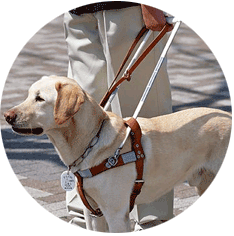
In accordance with the Americans with Disabilities Act of 1990
A service dog is trained to perform tasks for people with disabilities
Service dogs are working animals, not pets. Public access is required.
Business may ask:
- Is this a pet or is this a service dog?
- What tasks does the service dog perform?
Business may NOT ask:
- Businesses may not ask to require special identification for the dog. (Many guide dogs do not have vests or ID)
- Ask about the person’s disability
- Charge additional fees because of the dog
- Refuse admittance, isolate, segregate, or treat this person less favorably than other patrons
- Claim allergies or fear of animals as valid reasons for denying or refusing access
- Harass team by constant questioning by different staff members
A person with a disability cannot be asked to remove their service animal unless
- The animal is out of control and the handler does not take effective action to control it
- The animal poses a direct threat to the health or safety of others
Any business that sells or prepares food must allow service animals in public areas even if state or local health codes prohibit animals on the premises.Refusal to provide equal access to people with disabilities with service animals is a federal civil rights violation, provided by the American Disability Act of 1990. Violators of the ADA can be required to pay money damages and penalties.
Businesses should train ALL customer contact employees about these laws
Though service animals of all kinds can legally accompany their disabled handler almost anywhere the handler goes, they can be excluded from areas where their presence would constitute either a fundamental alteration of goods and services for all or a direct threat to safety.
Examples where a service animal might be excluded include:
- Sterile rooms, such as operating rooms, some areas of emergency rooms/departments
- Some ICU rooms, some ambulances, some delivery rooms
- Clean rooms where microchips are manufactured
- Places where food is prepared, i.e. kitchens (by order of most Health Departments) Though they cannot generally be excluded from dining areas where food is present
- Open air zoological exhibits, such as open air aviaries (at the zoo’s discretion)
- Churches (at the churches discretion)
- Native American Tribal Council Chambers (at the council’s discretion)
- Federal Courts (at the judge’s discretion)
- Private clubs (at the club’s discretion)
- Private homes (at the home owner’s discretion)